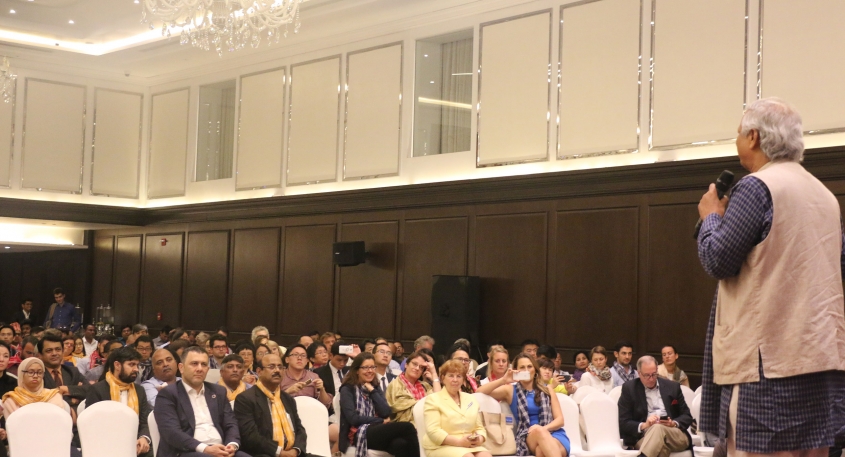The content is not available for Bangla language.
Programs of Social Business Day 2017 Went Ahead with International Delegates, Arrived for the Conference, Deliberated on Wealth Concentration
28 July, 2017 Dhaka Bangladesh
Sessions Live Telecast on Facebook
Sessions, scheduled to held at the cancelled 7th Social Business Day (SBD) was held today, participated by foreign guests who already arrived to join the conference, at a conference room of Hotel Le Meridian. The program was supposed to be held at Samajik Convention Centre in Zirabo, Savar, Dhaka with the theme “Can Wealth Concentration be Stopped?”. The announcement of the live telecast of the sessions was sent from Yunus Centre to media with the cancellation statement at the evening on 27th july, 2017.
At the beginning of the session, Ms Lamiya Morshed, Executive Director, Yunus Centre, presented the welcome speech on behalf of Yunus Centre and thanked the present guests.
Nobel Peace Laureate Professor Muhammad Yunus welcomed almost 250 international participants representing over 50 countries. He said, ”This is a gathering of social business practitioners, academics and enthusiasts what we call a family gathering. We wait the whole year for this day to come together and see each other and share our views.” He regretted for not being able to welcome all interested participants physically, especially more than thousand local registered participants and media guests this time but thanked the viewers who were with the facebook page of Yunus Centre from the very beginning of the sessions at 10.30 in the morning.
Mr. Thomas Gass, Assistant Secretary General of the United Nations, the focal point of UN’s Sustainable Development Goals (SDG) delivered the keynote speech. Thomas Gass talked about how sustainable development goals can be achieved and also mentioned how social business promotes a shared vision of humanity. He said social business will be most successful in countries that are struggling to achieve SDGs. Mr. Joël Bouzou, President of the World Olympians Association delivered his greeting speech where he talked on the subject of the Olympic movement, society and social business. He said that many potential athletes cannot practice sports because of scarcity of facilities which can be resolved through social business. According to him everyone deserves equal chance to compete and to excel. Mr. Rodrigo Castañeda, Chief, Partnerships Unit, Partnerships, Advocacy and Capacity Development Division, FAO, Italy, Mr. Bei Duoguang, Director, China Academy for Financial Inclusion, Former Managing Director, China International Capital Corporation, China, Mr. Nicolas Hazard, Head of the strategic committee Paris, Representative of Mayor, Paris also delivered their speeches.
Video greetings by Jose Graziano da Silva, director-general of the Food and Agriculture Organization (FAO), Erik Solheim, Head of United Nations Environment Programme (UNEP), Salman Khan of Khan Academy, Mayor of Paris Ms. Anne Hidalgo, Mr. Christoph Heinrich, Vice Chairman and Executive Officer of Conservation at WWF Germany, Her Excellency Maria Teresa Mestre y Batista, Grand Duchess of Luxembourg , Scott Morrison, Finance Minister of Australia and CEO of Unilever Limited Mr. Paul Polman were played after the greeting speeches.
Professor Muhammad Yunus moderated the opening plenary where Prof. Anil K. Gupta, Executive Vice Chair, Indian Institute of Management, National innovation Foundation, India, Mr. Richard St-Pierre, President, C2 Montréal, Canada, Prof. Jin-Huei Yeh, Associate Professor, Department of Finance, National Central University, Taiwan, Mr. Steve Hollingworth, President, Grameen Foundation, USA, Mr. Meng Zhao, Associate Professor in Organization and Strategy, Business School, Renmin University of China, Director, Yunus Center for Social Business & Microfinance, Renmin University of China (YCRUC) were the plenary speakers.
Mr. Hans Reitz, Grameen Creative Lab, Germany moderated the second plenary where speakers were Nobel Peace laureate Professor Muhammad Yunus, Mr. Joël Bouzou, President of the World Olympians Association, Dr. Anne W. Bunde-Birouste, Founder, YSBHH, School of Public Health and Community Medicine, University of New South Wales, Australia.
Another plenary for present and future of Corporate Action Tank was moderated by Mr. Jacques Berger, Managing Director, Action Tank and Social Business, HEC, Paris, France where Mr.Shankar Venkateswaran, Chief – Tata Sustainability Group, India, Mr. Rogerio Oliveira, Chief Partnerships Unit, YSB Brazil , Ms. Aarti Wig, Co-founder and Country Director, Yunus Social Business, India and Dr. Faiz Shah, Director, AIT, Thailand were plenary speakers.
MOU signing for setting up Yunus Social Business Centre (YSBC) with seven renowned international universities took place at the event. The universities are Autonomous University of Baja California (UABC), México, Chandigarh University, India, Catholic University of Zimbabwe, Universiti Putra Malaysia, Bethlehem University, Palestine and the Chinese University of Hong Kong (CUHK) will be launching Yunus Social Business Centres (YSBC) at their respective campus. With these centres, the total number of YSBCs around the world now stands at 41.
There were several other discussion panels including Pecha Kucha sessions titled 1. Paris City Social Business 2. Grameen China 3. Barcelona Social Business City 4. Danone Communities Fund 5. Grameen Telecom Trust (GTT) 6. Nepal Social Business Fund & 7. Academia: Update about YSBC.
A video based online social business course was also launched today with an aim to reach a target of enrolling half a million subscribers and break the Guinness Book of World Record for the highest number of enrollment in an online course. The course is created by a set of professional course creators led my Mr Wajed Salam from the United States.
At his concluding speech Professor Yunus emphasised on the importance of starting small and work consistently to realize the vision of achieving three zeroes; zero unemployment, zero poverty and zero net carbon emission. “If I can make one village archiving zero unemployment, I would think myself successful. This small achievement will also make people believe in themselves. They will move on to achieve zero poverty and then zero net carbon emission. Gradually it will be two villages, then cities and one day while country will achieve these three zeroes”, Professor Yunus said. A cultural program was held at the end.









